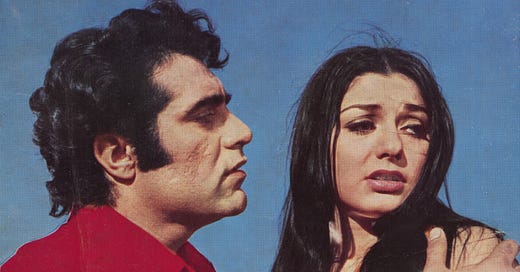None of What I’m Saying is Surprising or New
It’s about feelings that can be real but are not reliable
I am a very deep feeler. I cry during commercials, listen to sappy country songs, or even see a cute elderly couple walking down the street holding hands.
All day, we are fed truths and lies from every direction.
A TV show can cause us to become sad. A conversation with a friend can leave you feeling like your husband isn’t nearly as sweet as hers. The magazine rack at the store can make you feel less attractive. So many things feed into our emotions.
We have feelings. They are there for a reason.
You know you shouldn’t eat that piece of cake. But your brain has a different idea, “Hey, you’re feeling shitty today. A little piece should make you feel better.” And you happily agree, “Hey, you’re right! Thank you, brain!” What feels good swiftly feels right. And then you shamelessly inhale not one slice but three slices of cake.
If you do this sort of thing long enough — if you convince yourself that what feels good is the same as what is good — your brain will start mixing both up. Your brain will begin assuming the whole point of life is to feel as fabulous and often as possible.
And once this takes place, you’ll start conning yourself into believing that your feelings matter.
Feelings can be misleading. Have you ever gotten dejected by a friend for an entirely imagined reason? For example, a friend’s phone died, and you start thinking she didn’t want to talk to you and never liked you.
Shitty feelings. Right?
For many years, I confused talking about my feelings for actually feeling my feelings.
There’s a distinction.
I was good at recognizing my feelings.
I could unveil how I felt about an issue that was going on in my life.
I could give details about what narratives were being triggered surrounding my feelings.
But, slowing down to precisely feel those damn things?
No time, energy, or willingness to delve into the unpleasant feelings.
Permitting the sadness, pain, and disappointment to move through me was categorically unpleasant. I didn’t see the point.
Over time, I’ve come to value the bittersweet relief and freedom from letting emotional weather sail through instead of letting it get infested inside of me and allowing it to rot.
None of what I’m saying is surprising or new. You’ve probably tried to overcome some of your obnoxious feelings and impulses before and failed.
But let’s not ignore that message and allow yourself to feel the emotion until it dissolves. Maybe the feeling is steering you toward some action?
Years ago, when my husband and I were talking about getting married for the second time after a divorce that lasted for ten years, fear and anxiety began flying through my body for no apparent reason. I lost sleep; I was shopping excessively, and my stomach ached. Was I making the right decision? In other words, I was spinning aimlessly in my orbit, which didn’t make sense, given that I’d desired to get together.
The truth is, my feelings often get the best of me!
When I began to explore the emotional ambush, I understood that we needed to examine deeper concerns before.
The angst disappeared.
Ignored feelings go underground. When they’re buried, they don’t stay buried forever.
They often come back in even more confusing, less recognizable ways. Feelings don’t always have the language to tell you what is happening or why. They only have the crude tools to make themselves heard. They manifest in fear, anxiety, anger, and other behaviors that may be hard to connect to the “originating” event or situation.
Or how about feeling good about feeling bad? People who feel good about feeling bad enjoy a certain righteous indignation, feeling morally superior in their suffering and that they are somehow martyrs in a heartless world.
These long-suffering victimhood trend-followers are the ones who want to crap on someone’s life on the internet, who want to protest and throw shit at businessmen or politicians who are simply doing their best in a challenging, complex world.
Much of the social strife we’re experiencing results today from these meta-feelings. Moralizing mobs who see themselves as wronged and somehow unique in every minuscule hurt or setback they undergo.
These narratives are spun by us and fed by the tales developed in the media. Consumer culture encourages you to make decisions grounded in feeling great or shitty and then cheers you on for those decisions.
Look, I know you think the fact you feel upset or angry or anxious is important.
That matters. Hell, you undoubtedly believe that because you feel like your face just got shat on makes you significant. But it doesn’t. Feelings are just these… things that happen. The meaning we construct around them — what we decide is important or unimportant — comes later.
Just because your husband or wife funnily looked at you or spoke with a biting tone doesn’t mean they are mad at you.
Sometimes, people are rushed or even have a bad day. Unfortunately, you experience horrible feelings about a fictional negative outcome. Then, you walk around for days thinking that you are in trouble or that your life, as you know it, is over.
It doesn’t have to be that way.
What would it look like if you could dialogue with your feelings as if they were an embodied, physical presence before you? How would interacting with them, and how would it be different? What kind of questions would you ask? What kind of things would you say?





This is a very important post, and maybe fundamental to the operation of our lives and our society.
You start with the introduction that in your native culture, feelings were known to be the rewards and the juice of life, and they are an essential part of living. You also note that the input of your perceptions can jog those feelings, I think you illustrate that by comparison. (Seeing something beautiful might make you feel LESS attractive.) Comparison is a devil.
You delve into the reasons for feelings (there must be one, right?) Finally it comes down to "feeling good" might be the meaning of life? Even though you can get tricked by them. "I could talk about my feelings, but could I really let them in?"
Now we are into a definition. It is that: if emotions are expressed they don't infest the inside with their rot. Put another way, feel the emotion until it dissolves. (I don't say ignore any emotion and I certainly don't say suppress it by force). Understand it and its origin, maybe. Feelings might not have a language, but please look to see if there isn't a language behind them. And of course, the feeling is steering you toward some action. What is that action? Did you choose it among options, or was that the only option available at the time?
Also ask if it really dissipates? Most strong emotions have a long history. They are recurrent, we say all they way back to "childhood trauma". So hasn't that become your favorite watering hole? Now you are going to let it run again, just to "finally have it dissolve". No it is not going to dissolve; what you are doing is re-igniting it. You can ask: why do I love this replay? What do I get out of it? There is a payback.
"Much of the social strife we’re experiencing today results today these meta-feelings". ALL OF IT. It's the stories we listen to and those that we tell and retell. Why do we listen, and why do we spin these yarns? The meaning we construct around them — what we decide is important or unimportant — it comes later.
It doesn’t have to be this way.
"What would it look like if you could dialogue with your feelings as if they were an embodied, physical presence before you? How would you interact with them, and how would it be different? What kind of questions would you ask? What kind of things would you say?
BRILLIANT OBSERVATION.
I am sure you can. Just monitor your self-talk about every occurrence, whether positive or negative. Then ask: what if that is not true? How will I ever find out? You have to try out a different story. You can be the author of your interpretations and your definitions. But only one step at a time. Just change the story a little to see what happens. There is plenty of time for this patience.
.
Ah, consumer culture, which hooks us in to a particular way of feeling, which is "never enough." I took a photography course long ago, before digital cameras. The prof who worked in advertising, but was critical of it, said "advertising creates a picture of a life you would like to have, but you have to purchase it" Just buy this product.
It sounds absurd on the face of it, but ads work, otherwise companies would stop paying a ton of money to advertise. This is for all products. I ignore all ads, and now buy or consume less. Much less; only what I need. Now, that makes my life better.